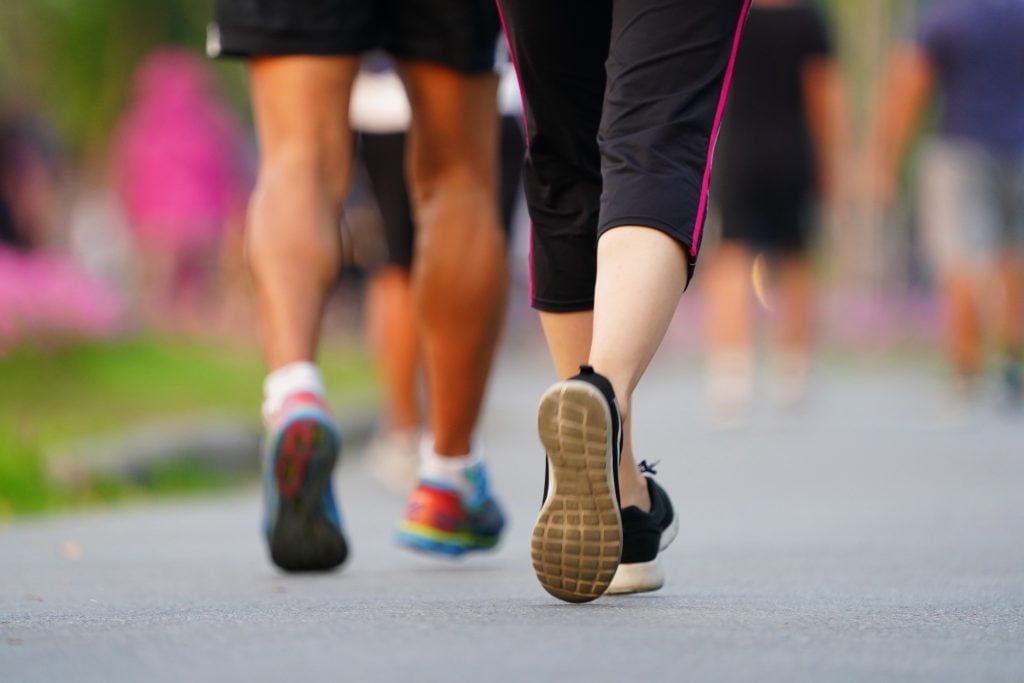
Contrary to popular belief, you don’t need to be an avid runner to complete a marathon.
Many individuals who participate in the race choose to walk instead of run. However, do the same rules apply when it comes to training? Can you walk a marathon without preparing for it?
The short answer is no. Although it may be possible, it is by no means advisable.
Whether you walk or run, marathons cover an extremely long distance and it’s imperative that you take safety precautions to avoid the risk of injury.
The goal of finishing a marathon isn’t completing the race in record timing but ensuring you do so without hurting yourself in the process.
Bear in mind that when you decide to walk a marathon, it’s likely that you may take anywhere from six to nine hours, which exceeds the amount that is advised per day.
It goes without saying that’s an awful lot of time to be on your feet, which means more possibilities for minor injuries, such as dehydration, blisters, or muscle strains. Therefore, walking a marathon without training is neither practical nor recommendable.
Here are six of our top tips for training to walk a marathon.
1. Create a dynamic training schedule
Rather than jumping on the treadmill every day, it’s a good idea to incorporate a wide range of walking styles into your training plan.
Whilst training to walk a marathon, you should aim for four to five days active days per week on average. Don’t focus solely on long-distance walking, try to incorporate other forms of training that can help you reach your endurance goals.
Activities like CrossFit or yoga are very complimentary to a marathon training plan.

2. Build your mileage slowly
One of the most important tips to consider whilst training to walk a marathon is to build up your mileage steadily.
As you’re competing at a slower pace, you may be tempted to cut training times short and bump up your mileage up too quickly. The strategy behind any great marathon training plan is to build endurance cautiously and increase your pace in a relaxed manner.
If you are a beginner training for a marathon, we recommend that you start training four months prior and build your mileage up to 50-mile walks over the subsequent weeks.
3. Stretch after sessions
Resting your muscles after a training session is essential if you want to increase endurance and reduce the risk of injury.
Conducting regular stretches after power walking can help loosen up your muscles and joints, improve your range of motion, increase flexibility, and reduce soreness.
Ideally, you should aim to stretch before and after every training session. However, if you only have time for one, you should prioritise your cool-down stretches over warm-up ones.
4. Consider your footwear and clothing
Having the correct footwear and clothing will make all the difference when you are training to walk a marathon, especially since you’ll be wearing these items for six hours or more.
Make sure to pick clothes that fit you comfortably, as you’ll want to avoid any possible chafing. Bear in mind that running shoes won’t bode as well as walking shoes.
If you’re planning on walking the entire marathon, opt for shoes that have less cushioning and greater flexibility than running ones. Comfort and support of the foot arch are key and insoles are a great go-to in order to negate the risk of sustaining injuries.

5. Hydrate and fuel your body
Given that you’ll be on your feet for a prolonged period of time, you’ll need to ensure you remain hydrated during the whole race.
Don’t wait until you’re thirsty to take your first sip, drink slowly yet regularly throughout the marathon. In terms of fuel, you’ll want to eat light so that your body can digest any food easily, this includes items such as energy bars or small sandwiches.
The best kind of breakfast before a marathon is something simple like a bowl of porridge with banana.
6. Find a walker-friendly marathon
Before you get your hopes up and register for an upcoming marathon, make sure that it’s walker-friendly.
Not all marathons provide allowances for individuals who are competing at a slower pace. This is important as you may need to make use of the marathon aid stations, and roads may reopen to vehicles before you get the chance to cross the finish line.
Thankfully, a majority of marathons are walker-friendly, so you’ll have plenty of options to choose from. There are some you can even do for charity, such as Cancer Research’s Shine Night Walk, which are available in a range of distances.
Walking marathon FAQs
How long does it take to walk a marathon?
It is estimated that walking a marathon will take between six and nine hours to complete.
This is totally dependent on the individual’s pace, but taking the average walking pace - approximately 3.1 miles per hour - would give you a finish time of just over eight hours.
That said, brisk walkers who can sustain a quicker pace can expect to finish between six and seven hours.
Can you do a mixture of running and walking a marathon?
The short answer is yes, while it is also advised for most people that are taking part in a marathon.
For those that are not seasoned runners, adopting the run/walk method is the best approach to avoiding any injuries.
Running for a prolonged period of time when your body is not fully accustomed is stressful for our joints and muscles but by integrating you are alleviating that stress and giving your body the time to be able to build up to another running blast.
Can I walk the London marathon?
Absolutely. There are no rules against this, although it is worth keeping in mind that it will take you a long time to reach the finish line if you only walked.
If you are completing the London Marathon and taking a run/walk approach, there are certainly some spots where you may want to take a breather. Some of the sights are stunning!
Is walking a marathon harder than running it?
The first thing to say is that both running and walking a marathon are very strenuous on the body and need to be approached properly.
However, running a marathon would require far more physical exertion overall and would be more demanding on the body. More miles are being covered in a much shorter period of time.
Walking a marathon may take longer but the demands of it are staggered.
Final thoughts
Regardless of your marathon pace and finishing time, completing a marathon is an achievement that you should be immensely proud of. Just as any other participant, your health takes top priority.
This means taking the necessary precautions to avoid injury before, during, and even after race day. Once you feel the rush of crossing the finish line, we guarantee you won’t regret all the hard work and training.
If you have any questions or need some further advice about walking marathons, please don’t hesitate to contact us.
This blog is also part of a wider series about marathons, which you can check out below:
- Marathon Preparation: 4 Tips On What Not to Do
- Marathon Injury Prevention: Everything You Need To Know
- 6 Marathon Training Activities To Help With Your Preparation
- Pre and Post-marathon Recovery: How To Look After Your Body
- The Dangers of Not Taking Care of Minor Injuries Properly
- The Pitfalls of Running a Marathon without Training
Image credit: Shutterstock
